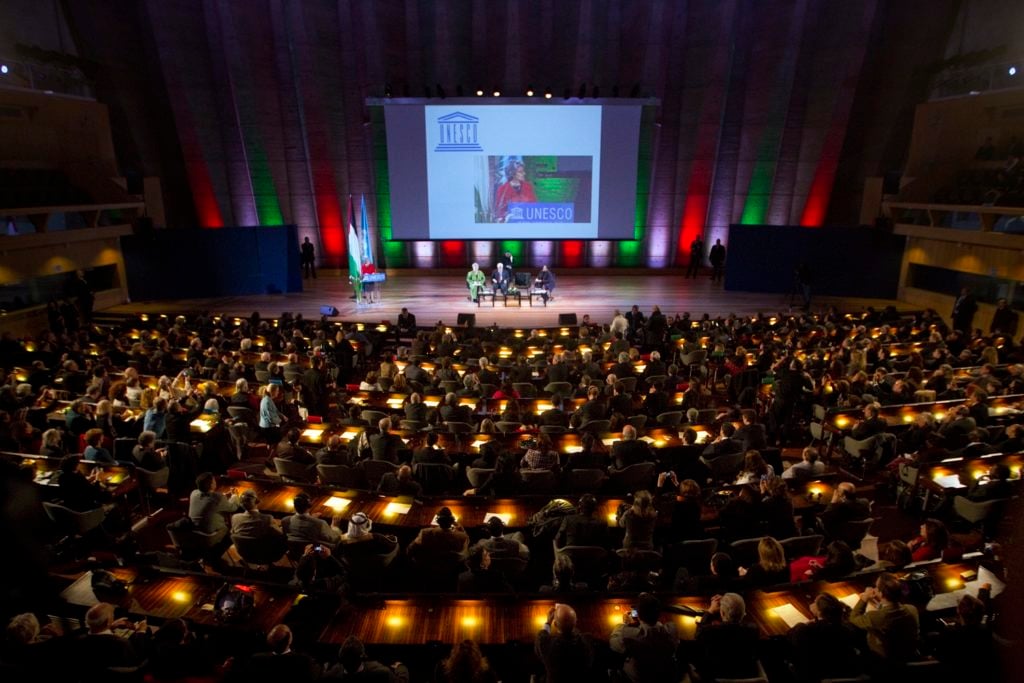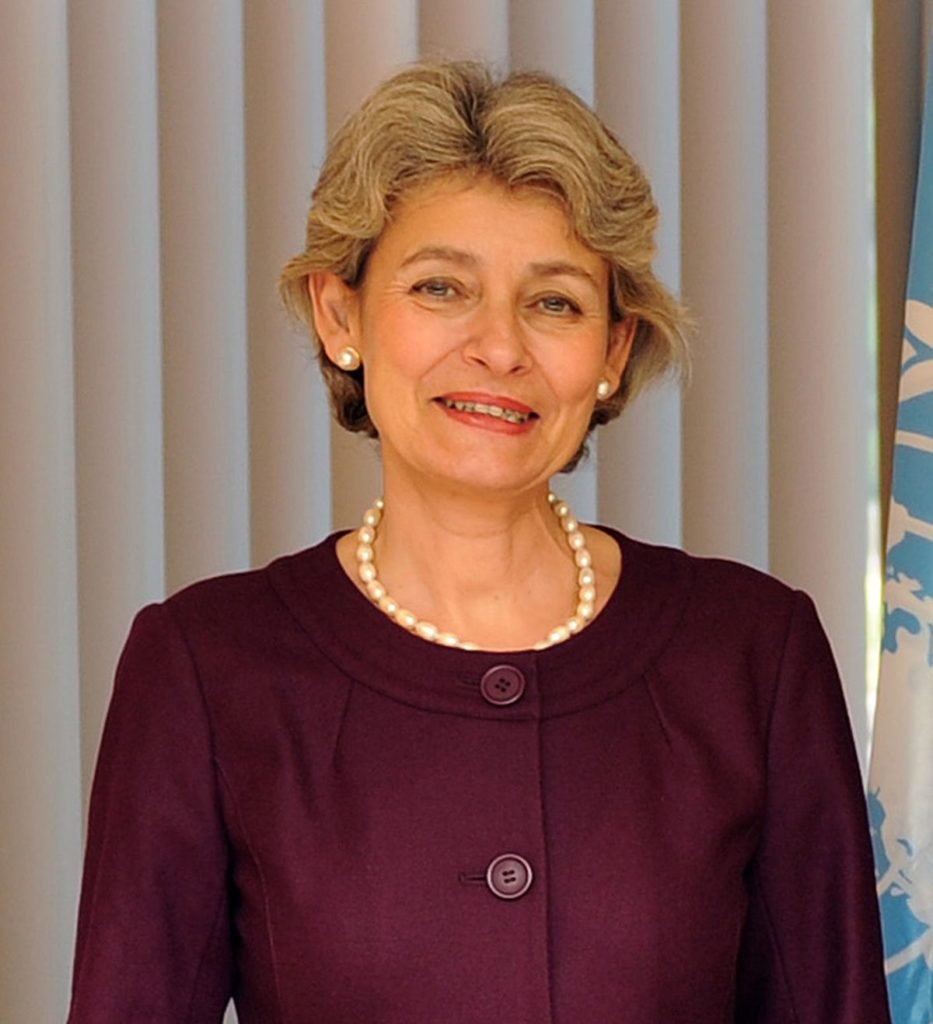Politics
Museums Are Angry About Trump’s Withdrawal From UNESCO—But What Does It Really Mean?
Experts say museums will not experience major upheaval, but they do fear that the Trump administration's decision will diminish UNESCO's influence.

Experts say museums will not experience major upheaval, but they do fear that the Trump administration's decision will diminish UNESCO's influence.

Julia Halperin &
Eileen Kinsella

Some of the most prominent cultural figures in the US, including the president of the Metropolitan Museum of Art in New York and the president of the J. Paul Getty Trust in Los Angeles, swiftly expressed their opposition to the US government’s decision to pull out of UNESCO. The move, announced yesterday and expected to go into effect at the end of next year, is viewed by many in the cultural sector as yet another example of the Trump administration’s isolationist policies. But experts say the move, which comes after years of strained relations between the US and UNESCO, is more symbolic than anything else.
The Met’s president Daniel H. Weiss said in a rare statement yesterday that the decision “undermines the historic role of the United States as a leader” and “weakens our position” in cultural heritage preservation and international education. “Although UNESCO may be an imperfect organization, it has been a… steadfast partner in this crucial work,” he said.
Jim Cuno, the president of the Getty Trust, noted in a statement that “we were disappointed to hear about the US decision” and praised the organization’s “important work protecting the world’s cultural heritage.”

Irina Bokova, the Director-General of UNESCO. Image courtesy of UNESCO/Michel Ravassard.
It’s been an eventful few days for UNESCO, which is dedicated to literacy, human rights, and heritage preservation. Soon after the US announced its decision to withdraw, Israel followed suit. Today, UNESCO elected a new director-general, Audrey Azoulay, France’s former culture minister, to replace Irina Bokova, who has led the organization since 2009.
Despite the political implications of the US’s decision, cultural heritage experts say it will not fundamentally alter the existing landscape—at least not right away. The US has not provided any funding to UNESCO since 2011 and has not been a voting member of its central decision-making body since 2013. Regardless of the withdrawal, the country remains bound by the UNESCO conventions that govern the protection of cultural heritage and the exchange and acquisition of ancient artifacts.
“As a colleague of mine put it, this is all optics and not substantive as far as any actions that would impact the US and its enforcement of those conventions,” says Nancy Wilkie, the president of the US Committee of the Blue Shield.
Still, even a symbolic move can have meaningful fallout. Some involved in the cultural heritage sector fear that a powerful country’s decision to step away from UNESCO could diminish the organization’s influence. “It is a very sad day,” says Peter Stone, the head of the School of Arts and Cultures at Newcastle University and a UNESCO chair. “UNESCO is there, and the whole of the UN is there, to try to bring the world together. If a major player decides to leave, that weakens both the country and UNESCO.”
This is not the first time the US has withdrawn from the sometimes-controversial organization. The Reagan administration left UNESCO in 1984 at the height of the Cold War because of a perceived bias toward the Soviet Union; the Bush administration rejoined in 2002.
“After years on the sidelines, President Bush decided, ‘Well maybe we better get in there and take a stand and have a voice,'” recalls James Reap, a professor at the University of Georgia and a fellow at the US Committee of the International Council on Monuments and Sites. “That’s the lost opportunity. That we’re not standing up there and asserting our principles and our rights, even if we lose a vote here or there.”
Maxwell Anderson, a former president of the Association of Art Museum Directors, notes that US institutions benefited when the country decided to return to the fold 15 years ago: “The museum sector was afforded increased dialogue with sister institutions overseas.”
Since then, UNESCO has ratified five conventions, declarations, and statements that address issues that matter to museums, from the intentional destruction of heritage sites to the promotion of diversity in collections. The organization “is the only world body to foster dialogue on matters of substantial interest to the museum establishment,” Anderson says. “These are issues [that] cannot be addressed in a vacuum within our borders.”

The Taos Pueblo outside of Taos, New Mexico. Designated by UNESCO in 1987. Image via Wikimedia.
Indeed, since its founding in 1945, UNESCO has played a large role in shaping international cultural policy. In addition to recognizing World Heritage sites, “it sets the bar of what the international community thinks is the right thing to do,” Stone notes.
The US passed its own legislation in 1983 that enshrines the organization’s 1970 Convention—which stated that an institution could not acquire, loan, or borrow any ancient object that had been exported from its country of origin after 1970—into law. That law remains in effect regardless of its withdrawal from UNESCO, experts note.
The Trump administration’s decision did not come out of nowhere. In fact, after the US rejoined UNESCO under Bush, its role began to shrink under the Obama administration. The government withdrew its $80 million in annual funding—around 22 percent of UNESCO’s total budget—when Palestine joined the organization in 2011. (The decision activated a long-forgotten amendment that required the US to cut off funding to any UN body that accepted Palestine as a full member.) The Obama administration sought unsuccessfully to restore funding, and the US lost its voting rights in 2013 after two years of nonpayment.
Some experts who work with UNESCO say the funding cut had a much bigger impact than any membership withdrawal ever could. “People’s contracts weren’t renewed, the organization shrunk, and that has an impact on what it can do and fund,” Stone says. “We still manage to do the work—it’s just not that easy and quick.”
Reap thinks finances played a key role in the US withdrawal, superseding even UNESCO’s designation of the Old City of Hebron in the West Bank as a Palestinian World Heritage Site in July, a move that drew outrage from both Israel and the US. “The tab is running and since we haven’t been paying—we owe half a billion dollars in past dues—the tab is going to keep running,” he says. “I think the realization is that… if we aren’t going to pay it we ought to quit the tab.”

The Palestinian Rehabilitation Committee raised the UNESCO flag next to the national Palestinian flag in front of Hebron’s Ibrahimi Mosque or the Tomb of the Patriarchs in 2011, a month after the Palestinians’ admission to the UN cultural agency sparked anger and reprisals from the United States and Israel. Hazem Bader/AFP/Getty Images.
Others say the withdrawal is a missed opportunity for improved relations between Israel, Palestine, and other Arab countries. Pattty Gerstenblith, the director of the Center for Art, Museum and Cultural Heritage Law at DePaul University, notes that days before yesterday’s announcement, a group of Arab countries decided to withdraw several controversial Israel-related resolutions. “I think it’s unfortunate that the US chose this timing because we could have used our leverage to get the Arab countries to be more accommodating,” Gerstenblith says. “The irony now is there’s no need for them to try to be accommodating.”
Moving forward, the US plans to participate in UNESCO as a non-voting observer state. But the administration might consider rejoining even before it formally withdraws at the end of 2018. If UNESCO returns “to a place where they’re truly promoting culture and education on all of that, perhaps we could take another look,” Heather Nauert, a spokeswoman for the State Department, said at a briefing yesterday, according to the New York Times.
Some cultural heritage experts, however, have already turned their hopes to the next administration. “America’s recent withdrawal from the world stage is, one assumes, just a fleeting reflection of the current president’s jingoistic impulses,” Anderson says, “and the next US president will almost certainly rebuild our connections with international organizations and conventions.”